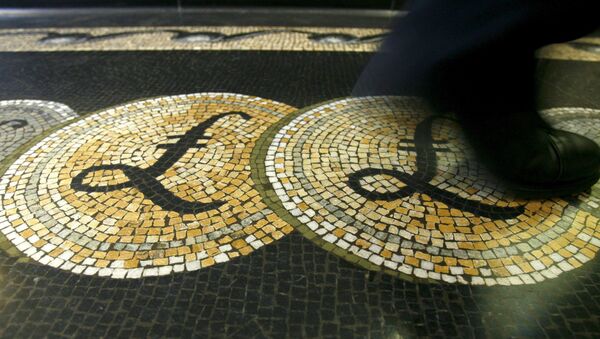The British pound has hit a three-year low in the past few months, and is currently struggling to reverse the trend, although it still remains below its $1.20 milestone. This is the weakest point since October 2016, when the sterling survived a brief “flash crash” on the heels of the June 2016 vote.

News about the struggling pound keeps coming in amid speculation on a Brexit-related snap election and a significant recorded slump in construction across the UK.

According to Duncan Brock of the Chartered Institute of Procurement and Supply, as cited by The Guardian, the downward trend in construction business shows an urgent need for clarity about Brexit, as many British-based firms have found themselves on tenterhooks vis-à-vis their prospects.
For instance, the data firm Markit reported that builders suffered the most sizeable fall in new business since March 2009, with housebuilding, commercial construction, and civil engineering companies all affected and hitting their lowest point since December 2008, the last economic crunch.
Meanwhile, the weakening of the pound following the Brexit referendum in June 2016 has enabled foreign investors to cherry-pick and effectively buy out UK assets of their choice: in April-June alone, foreign companies laid out a staggering £18.4bn on buying UK companies, nearly twice up from the £10.8bn in January-March, according to new figures from the Office for National Statistics.
Per Rob Donaldson, in charge of the RSM’s corporate finance, the slump in the pound is making UK companies genuine prey, not predators:
“Given the persistent weakness of sterling overseas acquisition by UK companies is challenging whereas inbound investment from abroad is, despite some of the obvious uncertainties for the UK economy, encouraged by the relatively low multiples in the UK particularly when sterling weakness is taken into account”, The Guardian cited the financier as saying.
Companies reported that the Brexit-related limbo was inviting further “risk aversion” and encouraging clients to get set on consolidation, rather that acquisition and business extension.
The prospects for the future are hardly seen as bright, as analysts agree there is real danger that the pound will end the day at its lowest closing level in 34 years, while MPs are set to vote tonight on whether to block a no-deal scenario by seeking another “EU divorce” extension – something that may even result in a new election in weeks to come.
Plenty of day left to go, but last time sterling closed below $1.20 according to the Bank of England's data was on 9th April 1985. pic.twitter.com/3mbuc59XTy
— Rupert Seggins (@Rupert_Seggins) September 3, 2019
Should a snap vote become a reality, the pound is likely to fall further, Elsa Lignos of the Royal Bank of Canada predicted, as cited by the British newspaper:
“Tory MPs have been told they will be de-selected which some speculate could dissuade younger MPs but with the govt’s majority so tight, the opposition’s hurdle is achievable”, she said.
The sterling would fall below parity with the euro if there is a no-deal Brexit, predicted Ranko Berich, head of market analysis at Monex Europe. According to Berich, the “fragile support” provided by Boris Johnson’s trips to Paris and Berlin last week have been obliterated by the political theatre back in Westminster.
“No-deal risk remains the be all and end all for sterling”, the analyst noted.
One pound is currently worth €1.096, meaning one euro is worth 91.2p.
In a new Brexit-related development since Boris Johnson’s election as British prime minister, the British Parliament is to rush a bill preventing him from pressing on with leaving the EU on 31 October without a deal.
Some Tories have also supported the legislation, despite Johnson’s warning that he would counter whatever defeat by setting up an early vote.
Boris Johnson has explained that his willingness to embrace a no-deal Brexit will enable the UK to exert pressure on the EU to sit down at the negotiating table with Britain in order to work out a new deal that the latter would find satisfactory.
Per Johnson, if the EU starts to believe that the cross-party alliance could block a no-deal scenario, then it will be “less likely” to compromise in any new negotiations.
He called the withdrawal deal lobbied for by his predecessor Theresa May “dead”, reiterating his determination to deliver Brexit by the long slated deadline of 31 October, “with or without a deal”. Reports earlier emerged that the prime minister was set to remove Remainer Conservative party rebels from their posts in a bid to purge the governing Tories of key Brexit opponents.




